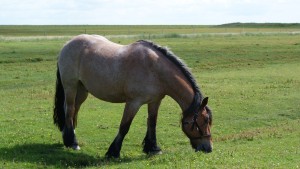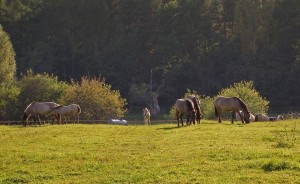
Spring is fast approaching and this time of the year, timing is everything. Grasses grow fast as the weather warms up, and so, grazing horses and spring pasture management is crucial.
It might be tempting to graze your horses out onto your field at the first sight of green spring grasses. However, it’s important to time and manage your pasture grazing. Below are a few tips to consider before you start grazing your horses.
A Few tips to consider before grazing horses
If you have fenced off your grazing land all winter, your pasture grasses had time to recover and you can begin to graze your horses now. However, putting your horses out to graze too soon or grazing too much could reduce the productivity of your grazing field in the summer and hurt your horses’ health. Proper grazing and balanced nutrition on the other hand would boost the health of your horses.
1. Your horses shouldn’t have too much grass too quickly
During the spring, your horses need time to adjust to the changes in diet and so, allowing them to have too much grass too quickly can be harmful for their digestive systems.
Limit grazing time for your horses. Begin with an hour at a time and work your way up to several hours over a few weeks period of time. Horses rely heavily on microbes in their gastrointestinal tract to process forages. If the eating habits are changed suddenly, the microbial population may not have enough time to adjust to the new diet.
2. Let your healthy grasses grow
 To avoid soil being compacted and suffocating your growing plants, avoid grazing horses on your pasture when the ground is still soggy. When the ground firms up, your grasses have a better chance of growing.
To avoid soil being compacted and suffocating your growing plants, avoid grazing horses on your pasture when the ground is still soggy. When the ground firms up, your grasses have a better chance of growing.
Wait until your grasses are at least 6 inches tall, and then you can ease your horses into your pasture, gradually increasing the grazing time.
3. Rotate your pastures
You can keep your grasses healthy by rotating your pasture grazing areas. You can divide your pasture into smaller grazing fields and rotate your horses through them. This way, one area of your pasture can still grow and recover while others get grazed.
4. Stocking rates
Make sure your horses have large enough areas for grazing. As a standard rule, 2 acres per 1000 lb horse is recommended. Also make sure that the fences are properly in place. Gates should be placed firmly for guiding and controlling movement of horses from stalls to the pastures.
5. Cover up bare spots
Bare spots in your pasture can encourage weed growth and mud during the summer. Spread grass seeds on bare spots or in areas where no grass is growing, or where grass is not growing as thickly as you’d like.
6. Do a soil test of your pasture
 Pasture grasses almost always grow on their own, and don’t need additional fertilizers to grow healthy. Overuse of fertilizers can cause harm to your horses and also to the environment. Do a soil test to see if your soil really needs any additional nutrients to avoid wasting your time and money.
Pasture grasses almost always grow on their own, and don’t need additional fertilizers to grow healthy. Overuse of fertilizers can cause harm to your horses and also to the environment. Do a soil test to see if your soil really needs any additional nutrients to avoid wasting your time and money.
Organic fertilizers, horse manure and waste can be spread over your pasture for great results if needed. Chemical and synthetic fertilizers should be used with caution because they get washed into nearby bodies of water like streams and lakes, causing water pollution.
Conclusion
To keep your horses and pasture grasses healthy throughout spring and summer, managing your pasture is important. Dried hay and pasture grasses contain different amounts of moisture. A gradual change in feedstuff will allow the microbes to adjust to the changes, reduce toxin build up, and benefit both the horse’s digestive system and your pasture grasses.
P. S: Visit Alternative Health Concepts – Animal Health to learn more about BioEqualizer™ the only 100% natural Thymic Protein Immune System Supplement for horses, which builds their immune systems to naturally help prevent and treat disease.
Source: Alternative Health Concepts
Related articles and resources:
- How BioEqualizer Works
- Get your Pastures Ready for Spring Grazing
- Horse Feeding Tips – What Should you Feed?
- Can’t wait for Spring? Must Know Tips for your Pasture


